Evaluating Talent Management's Influence on Organisational Performance
VerifiedAdded on 2022/12/28
|12
|2742
|74
Project
AI Summary
This project proposal investigates the impact of talent management (TM) on organisational performance. It aims to evaluate the importance of TM, analyse its impact, and explore its relationship with organisational outcomes. The project includes a detailed literature review defining independent and dependent variables, such as TM practices and organisational performance metrics. The methodology section outlines an interpretivism research philosophy with a qualitative strategy, inductive approach, and primary data collection via questionnaires. The study will use a simple random sampling method with 30 employees from Primark and thematic data analysis. The project also covers activities, timescales, and ethical considerations, including consent and participant information. The research seeks to determine how TM practices affect employee performance and ultimately, organisational efficiency and competitive advantage. The project includes a Gantt chart outlining the timeline for each stage of the research process.
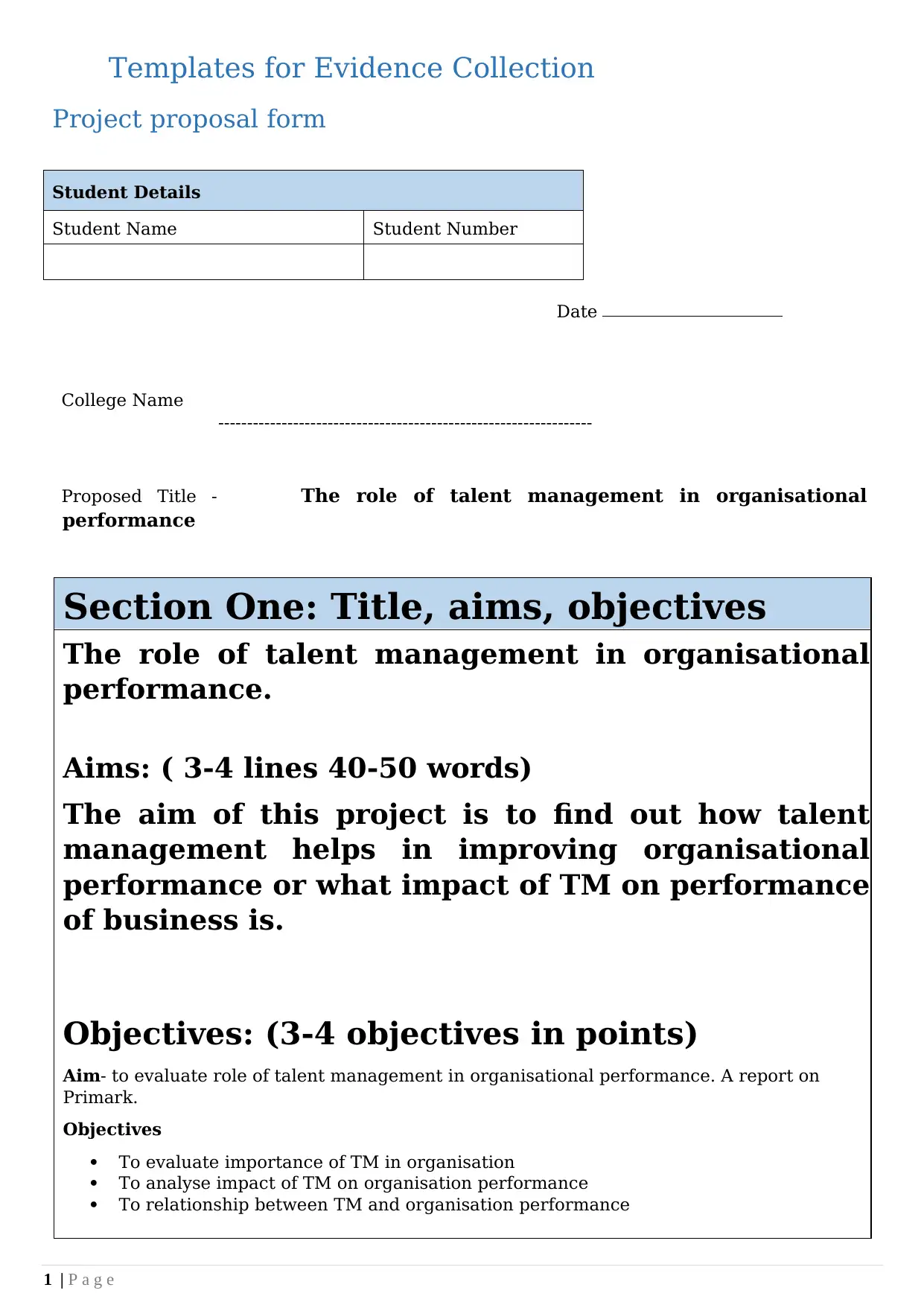
Templates for Evidence Collection
Project proposal form
Student Details
Student Name Student Number
Date
College Name
-----------------------------------------------------------------
Proposed Title - The role of talent management in organisational
performance
Section One: Title, aims, objectives
The role of talent management in organisational
performance.
Aims: ( 3-4 lines 40-50 words)
The aim of this project is to find out how talent
management helps in improving organisational
performance or what impact of TM on performance
of business is.
Objectives: (3-4 objectives in points)
Aim- to evaluate role of talent management in organisational performance. A report on
Primark.
Objectives
To evaluate importance of TM in organisation
To analyse impact of TM on organisation performance
To relationship between TM and organisation performance
1 | P a g e
Project proposal form
Student Details
Student Name Student Number
Date
College Name
-----------------------------------------------------------------
Proposed Title - The role of talent management in organisational
performance
Section One: Title, aims, objectives
The role of talent management in organisational
performance.
Aims: ( 3-4 lines 40-50 words)
The aim of this project is to find out how talent
management helps in improving organisational
performance or what impact of TM on performance
of business is.
Objectives: (3-4 objectives in points)
Aim- to evaluate role of talent management in organisational performance. A report on
Primark.
Objectives
To evaluate importance of TM in organisation
To analyse impact of TM on organisation performance
To relationship between TM and organisation performance
1 | P a g e
Paraphrase This Document
Need a fresh take? Get an instant paraphrase of this document with our AI Paraphraser
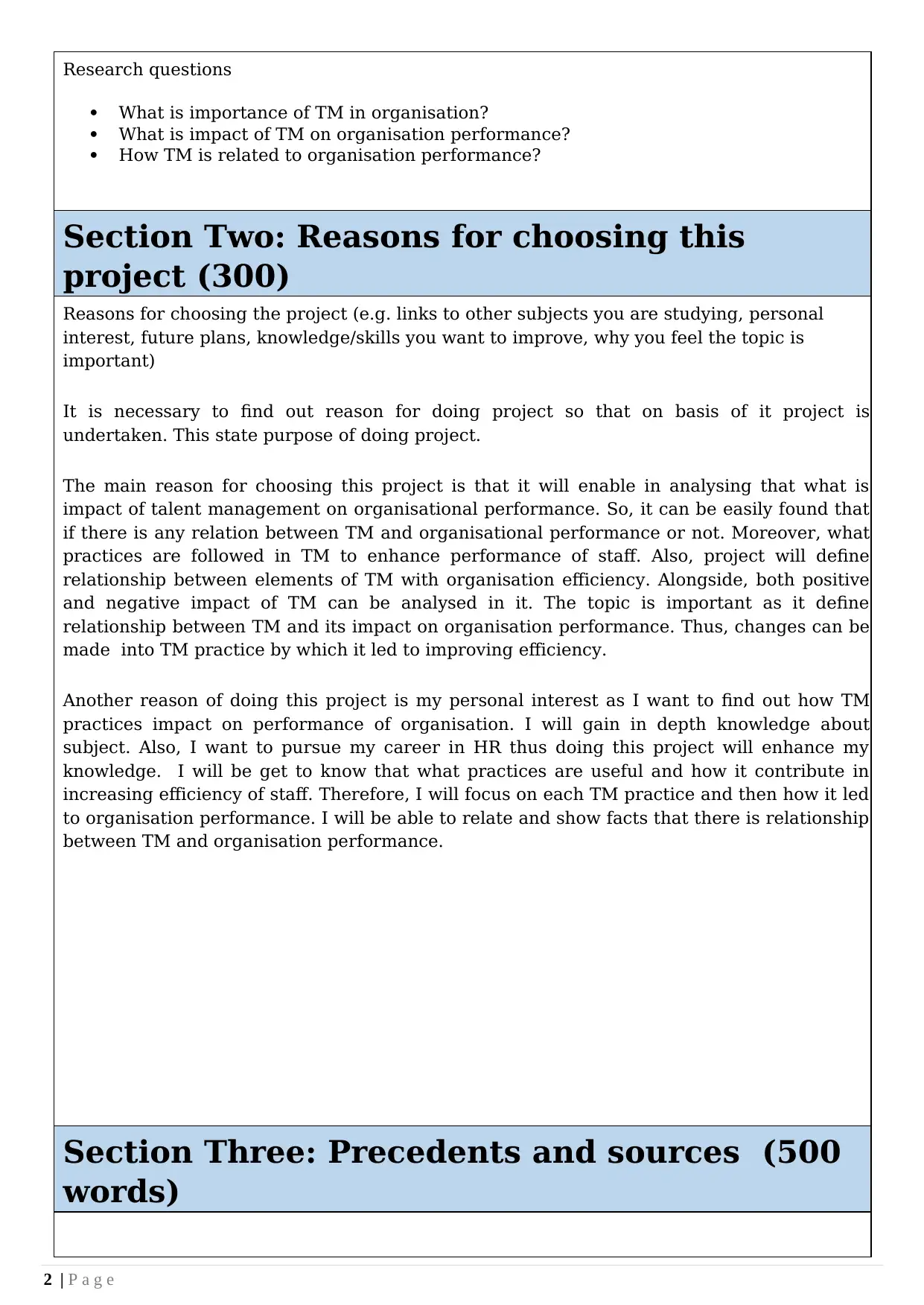
Research questions
What is importance of TM in organisation?
What is impact of TM on organisation performance?
How TM is related to organisation performance?
Section Two: Reasons for choosing this
project (300)
Reasons for choosing the project (e.g. links to other subjects you are studying, personal
interest, future plans, knowledge/skills you want to improve, why you feel the topic is
important)
It is necessary to find out reason for doing project so that on basis of it project is
undertaken. This state purpose of doing project.
The main reason for choosing this project is that it will enable in analysing that what is
impact of talent management on organisational performance. So, it can be easily found that
if there is any relation between TM and organisational performance or not. Moreover, what
practices are followed in TM to enhance performance of staff. Also, project will define
relationship between elements of TM with organisation efficiency. Alongside, both positive
and negative impact of TM can be analysed in it. The topic is important as it define
relationship between TM and its impact on organisation performance. Thus, changes can be
made into TM practice by which it led to improving efficiency.
Another reason of doing this project is my personal interest as I want to find out how TM
practices impact on performance of organisation. I will gain in depth knowledge about
subject. Also, I want to pursue my career in HR thus doing this project will enhance my
knowledge. I will be get to know that what practices are useful and how it contribute in
increasing efficiency of staff. Therefore, I will focus on each TM practice and then how it led
to organisation performance. I will be able to relate and show facts that there is relationship
between TM and organisation performance.
Section Three: Precedents and sources (500
words)
2 | P a g e
What is importance of TM in organisation?
What is impact of TM on organisation performance?
How TM is related to organisation performance?
Section Two: Reasons for choosing this
project (300)
Reasons for choosing the project (e.g. links to other subjects you are studying, personal
interest, future plans, knowledge/skills you want to improve, why you feel the topic is
important)
It is necessary to find out reason for doing project so that on basis of it project is
undertaken. This state purpose of doing project.
The main reason for choosing this project is that it will enable in analysing that what is
impact of talent management on organisational performance. So, it can be easily found that
if there is any relation between TM and organisational performance or not. Moreover, what
practices are followed in TM to enhance performance of staff. Also, project will define
relationship between elements of TM with organisation efficiency. Alongside, both positive
and negative impact of TM can be analysed in it. The topic is important as it define
relationship between TM and its impact on organisation performance. Thus, changes can be
made into TM practice by which it led to improving efficiency.
Another reason of doing this project is my personal interest as I want to find out how TM
practices impact on performance of organisation. I will gain in depth knowledge about
subject. Also, I want to pursue my career in HR thus doing this project will enhance my
knowledge. I will be get to know that what practices are useful and how it contribute in
increasing efficiency of staff. Therefore, I will focus on each TM practice and then how it led
to organisation performance. I will be able to relate and show facts that there is relationship
between TM and organisation performance.
Section Three: Precedents and sources (500
words)
2 | P a g e
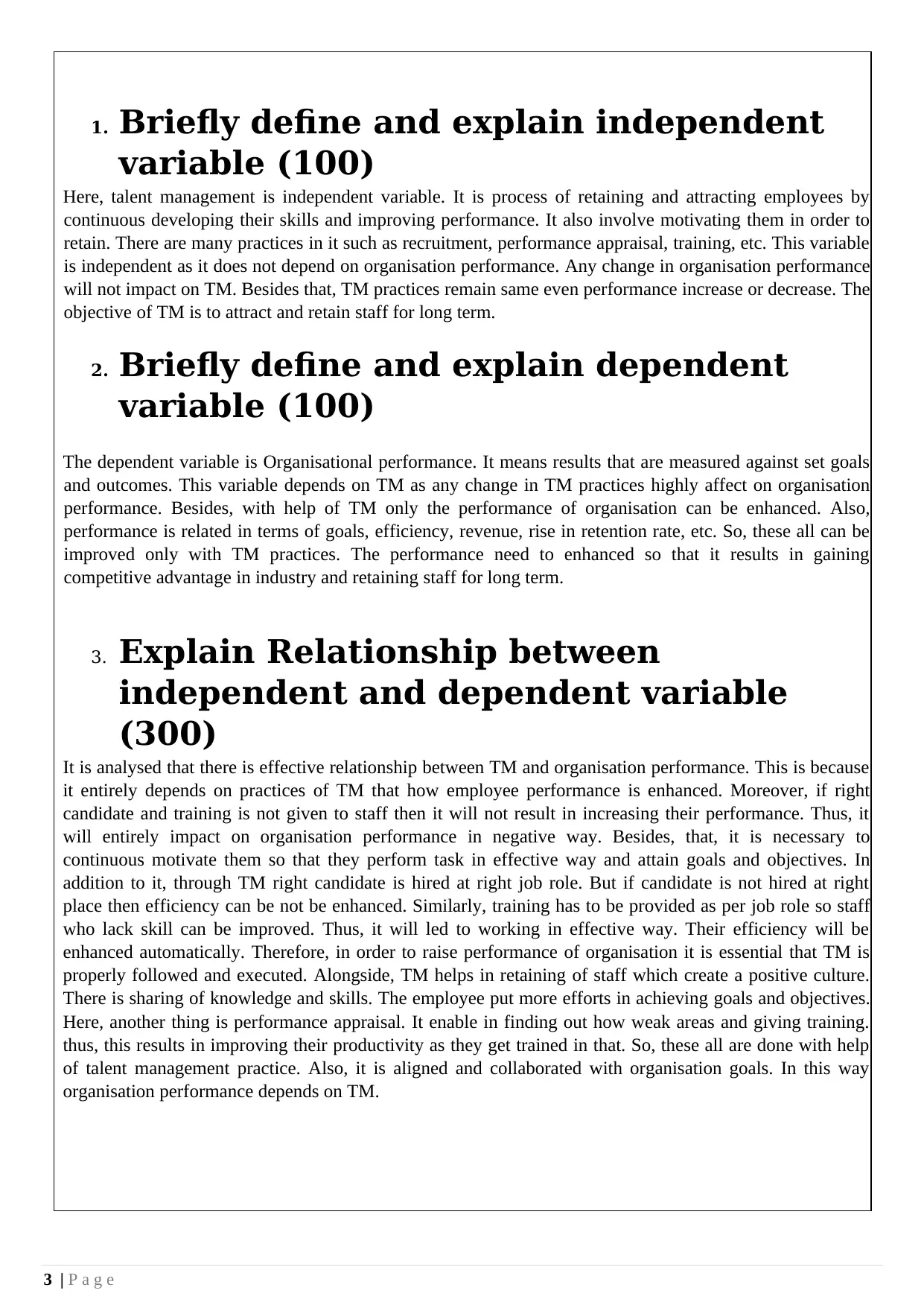
1. Briefly define and explain independent
variable (100)
Here, talent management is independent variable. It is process of retaining and attracting employees by
continuous developing their skills and improving performance. It also involve motivating them in order to
retain. There are many practices in it such as recruitment, performance appraisal, training, etc. This variable
is independent as it does not depend on organisation performance. Any change in organisation performance
will not impact on TM. Besides that, TM practices remain same even performance increase or decrease. The
objective of TM is to attract and retain staff for long term.
2. Briefly define and explain dependent
variable (100)
The dependent variable is Organisational performance. It means results that are measured against set goals
and outcomes. This variable depends on TM as any change in TM practices highly affect on organisation
performance. Besides, with help of TM only the performance of organisation can be enhanced. Also,
performance is related in terms of goals, efficiency, revenue, rise in retention rate, etc. So, these all can be
improved only with TM practices. The performance need to enhanced so that it results in gaining
competitive advantage in industry and retaining staff for long term.
3. Explain Relationship between
independent and dependent variable
(300)
It is analysed that there is effective relationship between TM and organisation performance. This is because
it entirely depends on practices of TM that how employee performance is enhanced. Moreover, if right
candidate and training is not given to staff then it will not result in increasing their performance. Thus, it
will entirely impact on organisation performance in negative way. Besides, that, it is necessary to
continuous motivate them so that they perform task in effective way and attain goals and objectives. In
addition to it, through TM right candidate is hired at right job role. But if candidate is not hired at right
place then efficiency can be not be enhanced. Similarly, training has to be provided as per job role so staff
who lack skill can be improved. Thus, it will led to working in effective way. Their efficiency will be
enhanced automatically. Therefore, in order to raise performance of organisation it is essential that TM is
properly followed and executed. Alongside, TM helps in retaining of staff which create a positive culture.
There is sharing of knowledge and skills. The employee put more efforts in achieving goals and objectives.
Here, another thing is performance appraisal. It enable in finding out how weak areas and giving training.
thus, this results in improving their productivity as they get trained in that. So, these all are done with help
of talent management practice. Also, it is aligned and collaborated with organisation goals. In this way
organisation performance depends on TM.
3 | P a g e
variable (100)
Here, talent management is independent variable. It is process of retaining and attracting employees by
continuous developing their skills and improving performance. It also involve motivating them in order to
retain. There are many practices in it such as recruitment, performance appraisal, training, etc. This variable
is independent as it does not depend on organisation performance. Any change in organisation performance
will not impact on TM. Besides that, TM practices remain same even performance increase or decrease. The
objective of TM is to attract and retain staff for long term.
2. Briefly define and explain dependent
variable (100)
The dependent variable is Organisational performance. It means results that are measured against set goals
and outcomes. This variable depends on TM as any change in TM practices highly affect on organisation
performance. Besides, with help of TM only the performance of organisation can be enhanced. Also,
performance is related in terms of goals, efficiency, revenue, rise in retention rate, etc. So, these all can be
improved only with TM practices. The performance need to enhanced so that it results in gaining
competitive advantage in industry and retaining staff for long term.
3. Explain Relationship between
independent and dependent variable
(300)
It is analysed that there is effective relationship between TM and organisation performance. This is because
it entirely depends on practices of TM that how employee performance is enhanced. Moreover, if right
candidate and training is not given to staff then it will not result in increasing their performance. Thus, it
will entirely impact on organisation performance in negative way. Besides, that, it is necessary to
continuous motivate them so that they perform task in effective way and attain goals and objectives. In
addition to it, through TM right candidate is hired at right job role. But if candidate is not hired at right
place then efficiency can be not be enhanced. Similarly, training has to be provided as per job role so staff
who lack skill can be improved. Thus, it will led to working in effective way. Their efficiency will be
enhanced automatically. Therefore, in order to raise performance of organisation it is essential that TM is
properly followed and executed. Alongside, TM helps in retaining of staff which create a positive culture.
There is sharing of knowledge and skills. The employee put more efforts in achieving goals and objectives.
Here, another thing is performance appraisal. It enable in finding out how weak areas and giving training.
thus, this results in improving their productivity as they get trained in that. So, these all are done with help
of talent management practice. Also, it is aligned and collaborated with organisation goals. In this way
organisation performance depends on TM.
3 | P a g e
⊘ This is a preview!⊘
Do you want full access?
Subscribe today to unlock all pages.

Trusted by 1+ million students worldwide
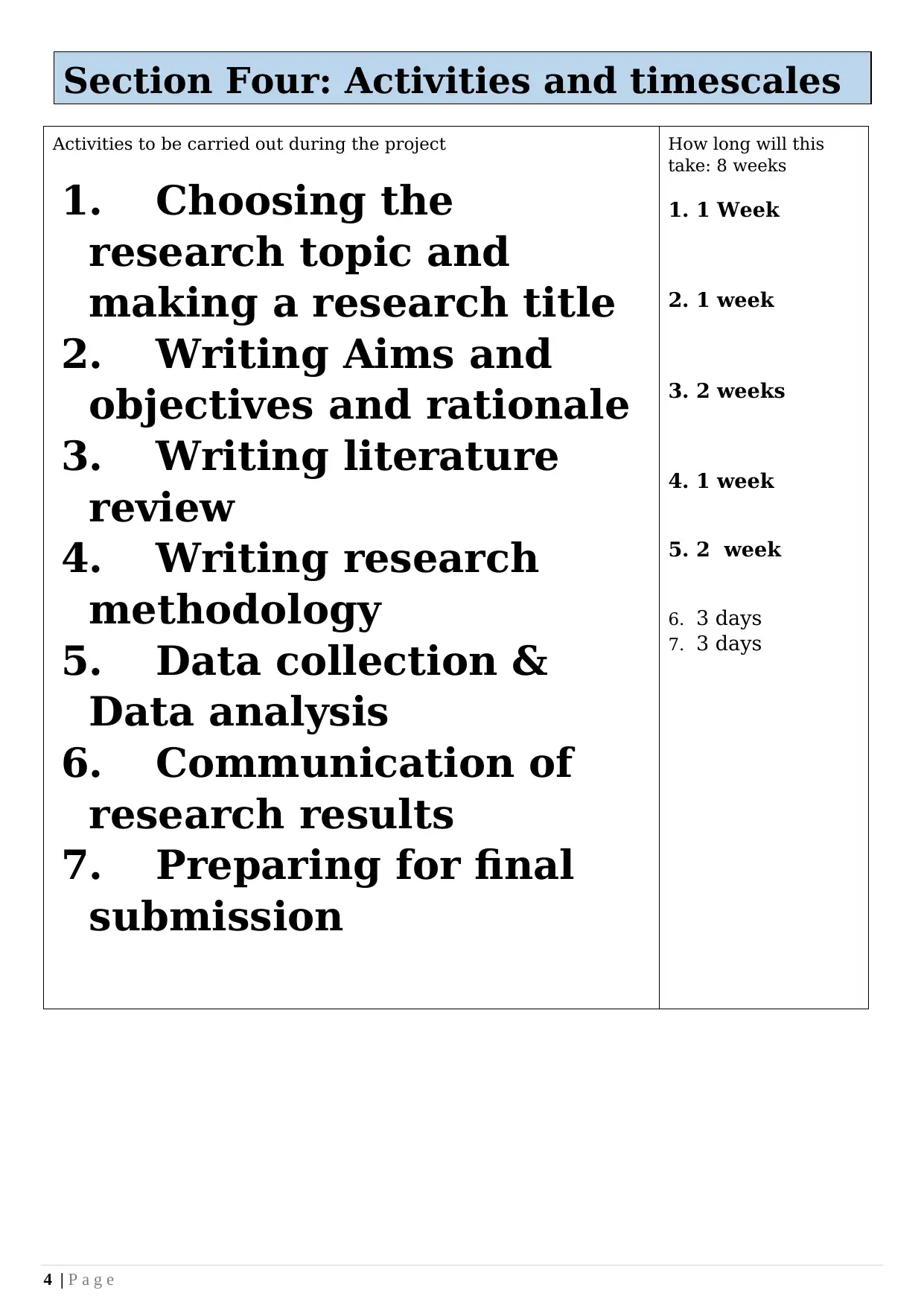
Section Four: Activities and timescales
Activities to be carried out during the project
1. Choosing the
research topic and
making a research title
2. Writing Aims and
objectives and rationale
3. Writing literature
review
4. Writing research
methodology
5. Data collection &
Data analysis
6. Communication of
research results
7. Preparing for final
submission
How long will this
take: 8 weeks
1. 1 Week
2. 1 week
3. 2 weeks
4. 1 week
5. 2 week
6. 3 days
7. 3 days
4 | P a g e
Activities to be carried out during the project
1. Choosing the
research topic and
making a research title
2. Writing Aims and
objectives and rationale
3. Writing literature
review
4. Writing research
methodology
5. Data collection &
Data analysis
6. Communication of
research results
7. Preparing for final
submission
How long will this
take: 8 weeks
1. 1 Week
2. 1 week
3. 2 weeks
4. 1 week
5. 2 week
6. 3 days
7. 3 days
4 | P a g e
Paraphrase This Document
Need a fresh take? Get an instant paraphrase of this document with our AI Paraphraser
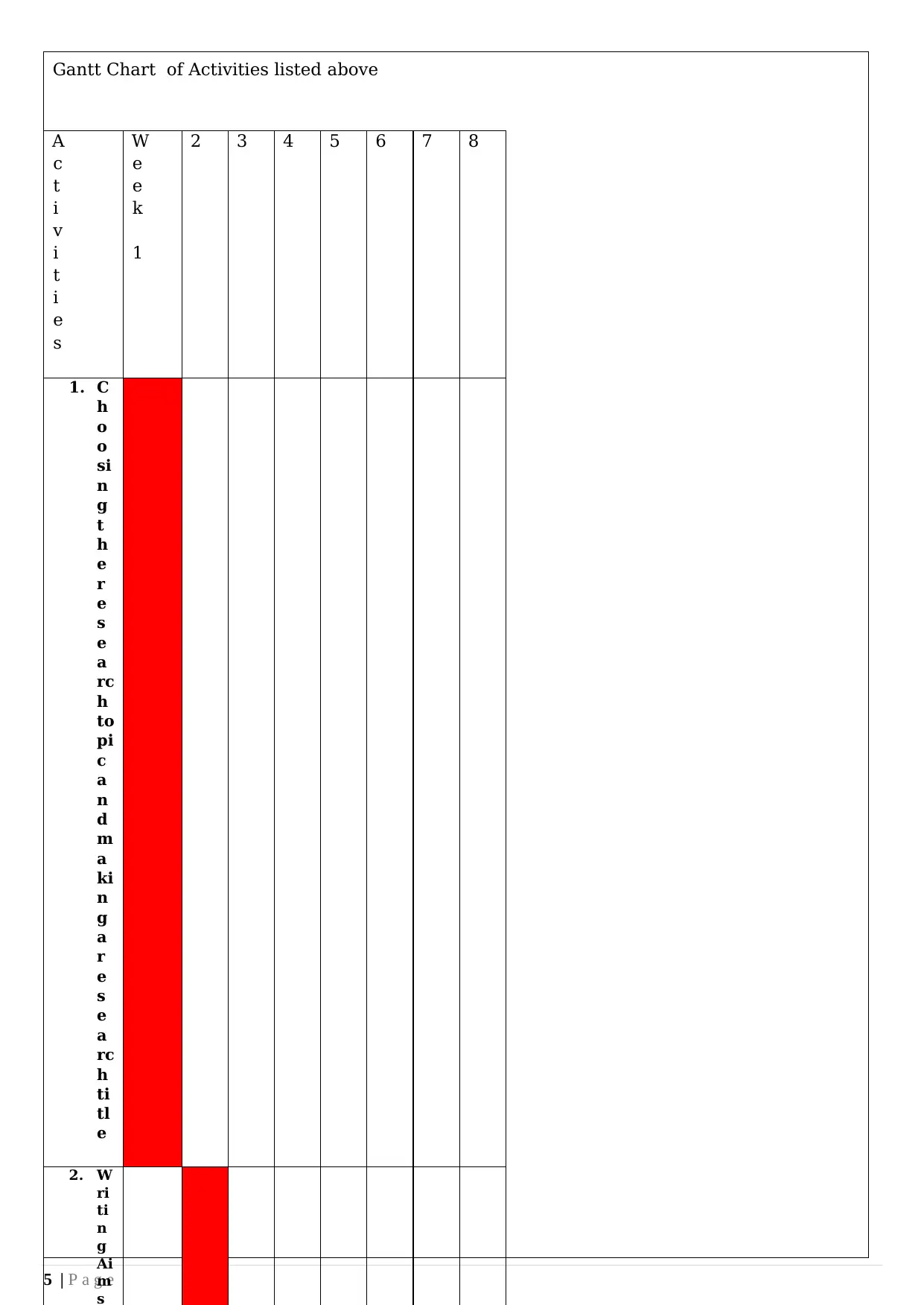
Gantt Chart of Activities listed above
5 | P a g e
A
c
t
i
v
i
t
i
e
s
W
e
e
k
1
2 3 4 5 6 7 8
1. C
h
o
o
si
n
g
t
h
e
r
e
s
e
a
rc
h
to
pi
c
a
n
d
m
a
ki
n
g
a
r
e
s
e
a
rc
h
ti
tl
e
2. W
ri
ti
n
g
Ai
m
s
5 | P a g e
A
c
t
i
v
i
t
i
e
s
W
e
e
k
1
2 3 4 5 6 7 8
1. C
h
o
o
si
n
g
t
h
e
r
e
s
e
a
rc
h
to
pi
c
a
n
d
m
a
ki
n
g
a
r
e
s
e
a
rc
h
ti
tl
e
2. W
ri
ti
n
g
Ai
m
s
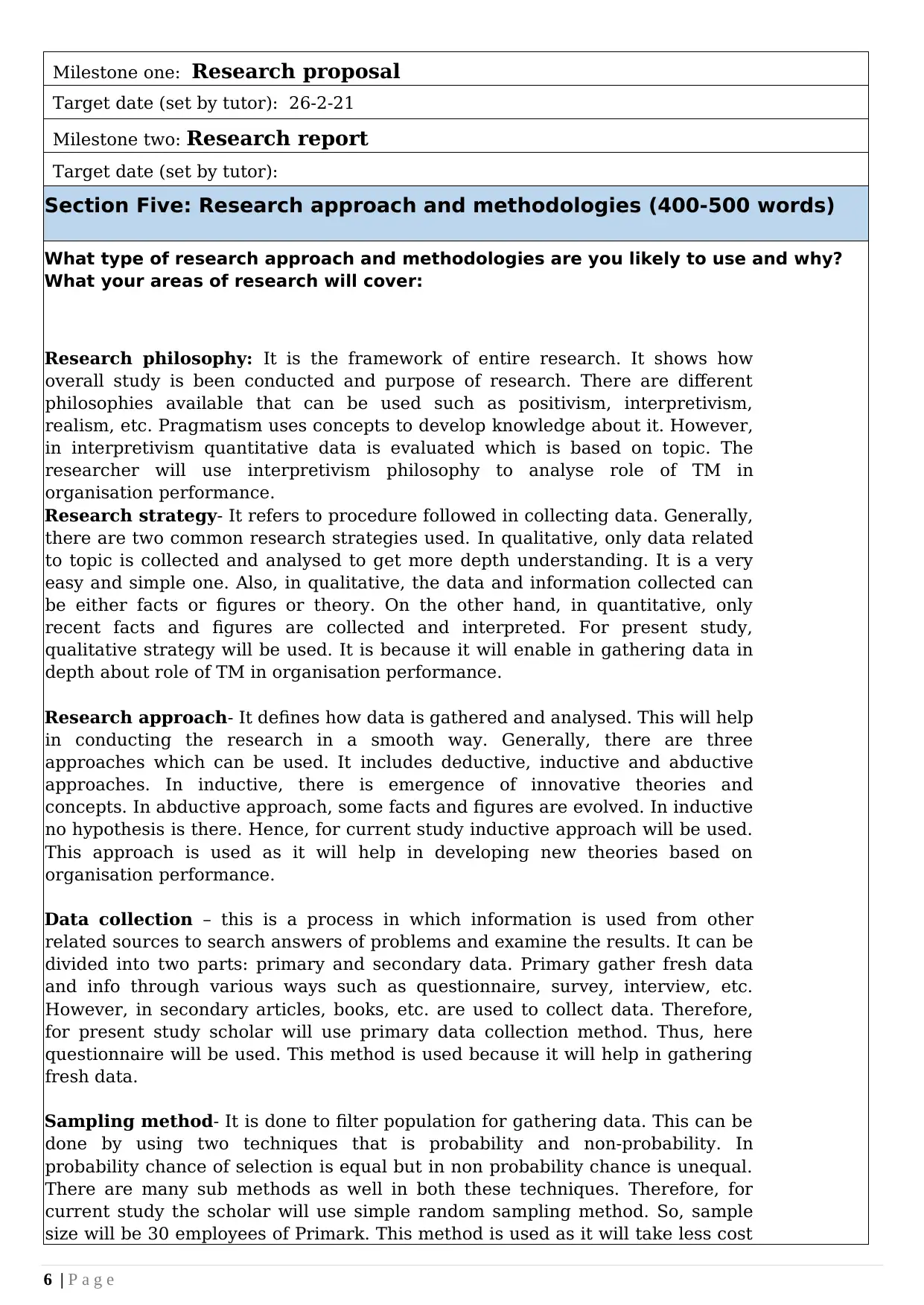
Milestone one: Research proposal
Target date (set by tutor): 26-2-21
Milestone two: Research report
Target date (set by tutor):
Section Five: Research approach and methodologies (400-500 words)
What type of research approach and methodologies are you likely to use and why?
What your areas of research will cover:
Research philosophy: It is the framework of entire research. It shows how
overall study is been conducted and purpose of research. There are different
philosophies available that can be used such as positivism, interpretivism,
realism, etc. Pragmatism uses concepts to develop knowledge about it. However,
in interpretivism quantitative data is evaluated which is based on topic. The
researcher will use interpretivism philosophy to analyse role of TM in
organisation performance.
Research strategy- It refers to procedure followed in collecting data. Generally,
there are two common research strategies used. In qualitative, only data related
to topic is collected and analysed to get more depth understanding. It is a very
easy and simple one. Also, in qualitative, the data and information collected can
be either facts or figures or theory. On the other hand, in quantitative, only
recent facts and figures are collected and interpreted. For present study,
qualitative strategy will be used. It is because it will enable in gathering data in
depth about role of TM in organisation performance.
Research approach- It defines how data is gathered and analysed. This will help
in conducting the research in a smooth way. Generally, there are three
approaches which can be used. It includes deductive, inductive and abductive
approaches. In inductive, there is emergence of innovative theories and
concepts. In abductive approach, some facts and figures are evolved. In inductive
no hypothesis is there. Hence, for current study inductive approach will be used.
This approach is used as it will help in developing new theories based on
organisation performance.
Data collection – this is a process in which information is used from other
related sources to search answers of problems and examine the results. It can be
divided into two parts: primary and secondary data. Primary gather fresh data
and info through various ways such as questionnaire, survey, interview, etc.
However, in secondary articles, books, etc. are used to collect data. Therefore,
for present study scholar will use primary data collection method. Thus, here
questionnaire will be used. This method is used because it will help in gathering
fresh data.
Sampling method- It is done to filter population for gathering data. This can be
done by using two techniques that is probability and non-probability. In
probability chance of selection is equal but in non probability chance is unequal.
There are many sub methods as well in both these techniques. Therefore, for
current study the scholar will use simple random sampling method. So, sample
size will be 30 employees of Primark. This method is used as it will take less cost
6 | P a g e
Target date (set by tutor): 26-2-21
Milestone two: Research report
Target date (set by tutor):
Section Five: Research approach and methodologies (400-500 words)
What type of research approach and methodologies are you likely to use and why?
What your areas of research will cover:
Research philosophy: It is the framework of entire research. It shows how
overall study is been conducted and purpose of research. There are different
philosophies available that can be used such as positivism, interpretivism,
realism, etc. Pragmatism uses concepts to develop knowledge about it. However,
in interpretivism quantitative data is evaluated which is based on topic. The
researcher will use interpretivism philosophy to analyse role of TM in
organisation performance.
Research strategy- It refers to procedure followed in collecting data. Generally,
there are two common research strategies used. In qualitative, only data related
to topic is collected and analysed to get more depth understanding. It is a very
easy and simple one. Also, in qualitative, the data and information collected can
be either facts or figures or theory. On the other hand, in quantitative, only
recent facts and figures are collected and interpreted. For present study,
qualitative strategy will be used. It is because it will enable in gathering data in
depth about role of TM in organisation performance.
Research approach- It defines how data is gathered and analysed. This will help
in conducting the research in a smooth way. Generally, there are three
approaches which can be used. It includes deductive, inductive and abductive
approaches. In inductive, there is emergence of innovative theories and
concepts. In abductive approach, some facts and figures are evolved. In inductive
no hypothesis is there. Hence, for current study inductive approach will be used.
This approach is used as it will help in developing new theories based on
organisation performance.
Data collection – this is a process in which information is used from other
related sources to search answers of problems and examine the results. It can be
divided into two parts: primary and secondary data. Primary gather fresh data
and info through various ways such as questionnaire, survey, interview, etc.
However, in secondary articles, books, etc. are used to collect data. Therefore,
for present study scholar will use primary data collection method. Thus, here
questionnaire will be used. This method is used because it will help in gathering
fresh data.
Sampling method- It is done to filter population for gathering data. This can be
done by using two techniques that is probability and non-probability. In
probability chance of selection is equal but in non probability chance is unequal.
There are many sub methods as well in both these techniques. Therefore, for
current study the scholar will use simple random sampling method. So, sample
size will be 30 employees of Primark. This method is used as it will take less cost
6 | P a g e
⊘ This is a preview!⊘
Do you want full access?
Subscribe today to unlock all pages.

Trusted by 1+ million students worldwide
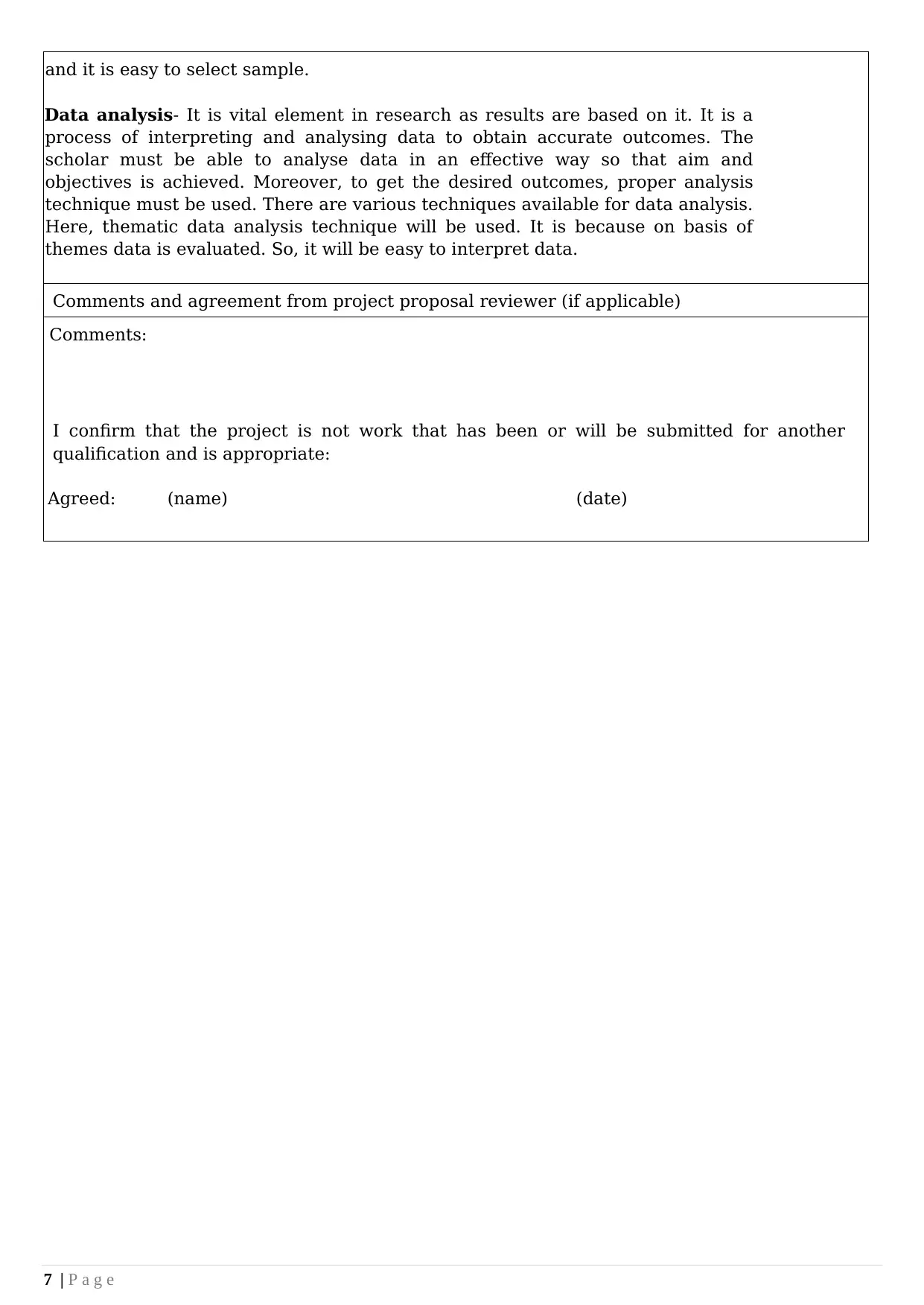
and it is easy to select sample.
Data analysis- It is vital element in research as results are based on it. It is a
process of interpreting and analysing data to obtain accurate outcomes. The
scholar must be able to analyse data in an effective way so that aim and
objectives is achieved. Moreover, to get the desired outcomes, proper analysis
technique must be used. There are various techniques available for data analysis.
Here, thematic data analysis technique will be used. It is because on basis of
themes data is evaluated. So, it will be easy to interpret data.
Comments and agreement from project proposal reviewer (if applicable)
Comments:
I confirm that the project is not work that has been or will be submitted for another
qualification and is appropriate:
Agreed: (name) (date)
7 | P a g e
Data analysis- It is vital element in research as results are based on it. It is a
process of interpreting and analysing data to obtain accurate outcomes. The
scholar must be able to analyse data in an effective way so that aim and
objectives is achieved. Moreover, to get the desired outcomes, proper analysis
technique must be used. There are various techniques available for data analysis.
Here, thematic data analysis technique will be used. It is because on basis of
themes data is evaluated. So, it will be easy to interpret data.
Comments and agreement from project proposal reviewer (if applicable)
Comments:
I confirm that the project is not work that has been or will be submitted for another
qualification and is appropriate:
Agreed: (name) (date)
7 | P a g e
Paraphrase This Document
Need a fresh take? Get an instant paraphrase of this document with our AI Paraphraser
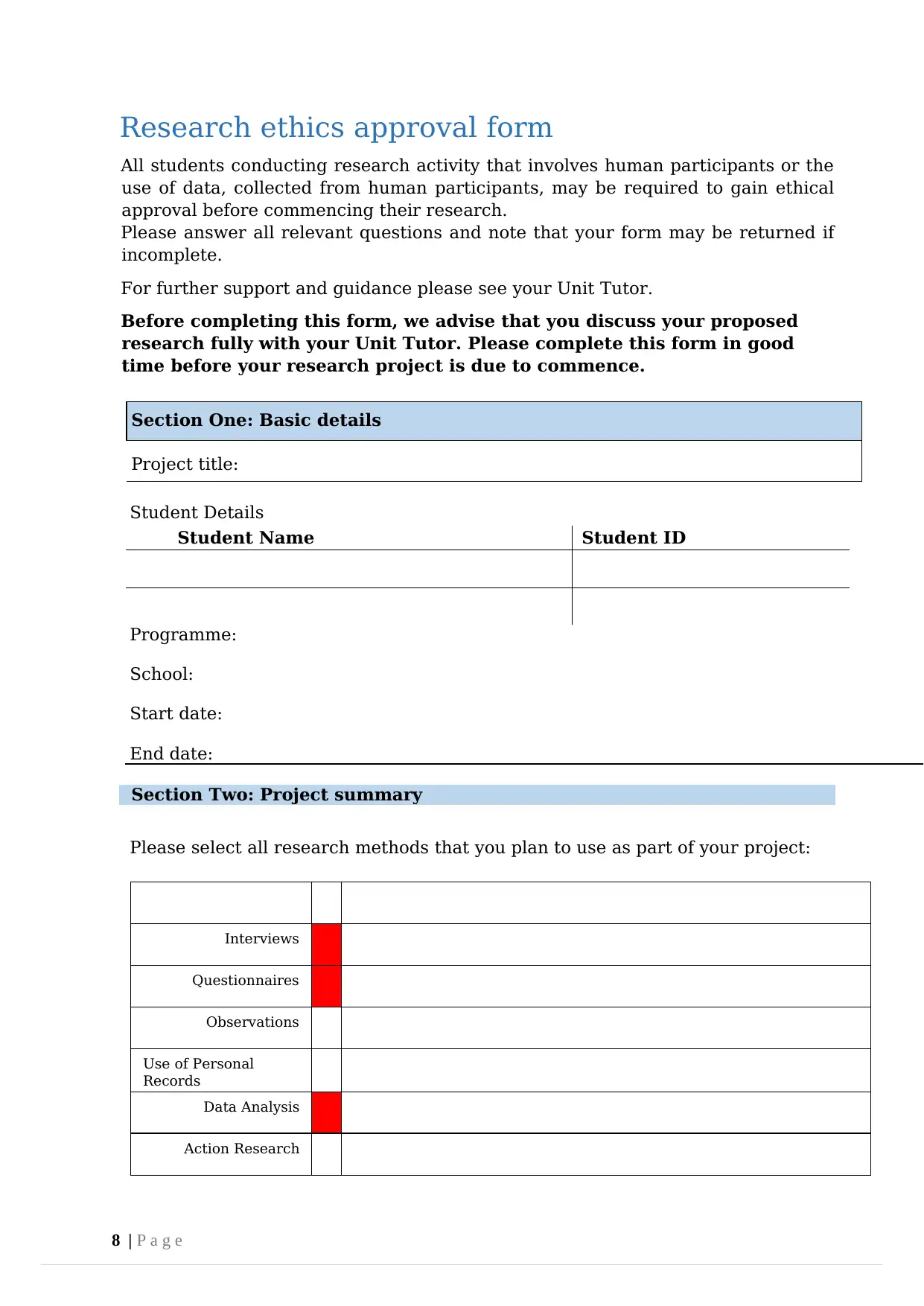
Research ethics approval form
All students conducting research activity that involves human participants or the
use of data, collected from human participants, may be required to gain ethical
approval before commencing their research.
Please answer all relevant questions and note that your form may be returned if
incomplete.
For further support and guidance please see your Unit Tutor.
Before completing this form, we advise that you discuss your proposed
research fully with your Unit Tutor. Please complete this form in good
time before your research project is due to commence.
Section One: Basic details
Project title:
Student Details
Student Name Student ID
Programme:
School:
Start date:
End date:
Section Two: Project summary
Please select all research methods that you plan to use as part of your project:
Interviews
Questionnaires
Observations
Use of Personal
Records
Data Analysis
Action Research
8 | P a g e
All students conducting research activity that involves human participants or the
use of data, collected from human participants, may be required to gain ethical
approval before commencing their research.
Please answer all relevant questions and note that your form may be returned if
incomplete.
For further support and guidance please see your Unit Tutor.
Before completing this form, we advise that you discuss your proposed
research fully with your Unit Tutor. Please complete this form in good
time before your research project is due to commence.
Section One: Basic details
Project title:
Student Details
Student Name Student ID
Programme:
School:
Start date:
End date:
Section Two: Project summary
Please select all research methods that you plan to use as part of your project:
Interviews
Questionnaires
Observations
Use of Personal
Records
Data Analysis
Action Research
8 | P a g e
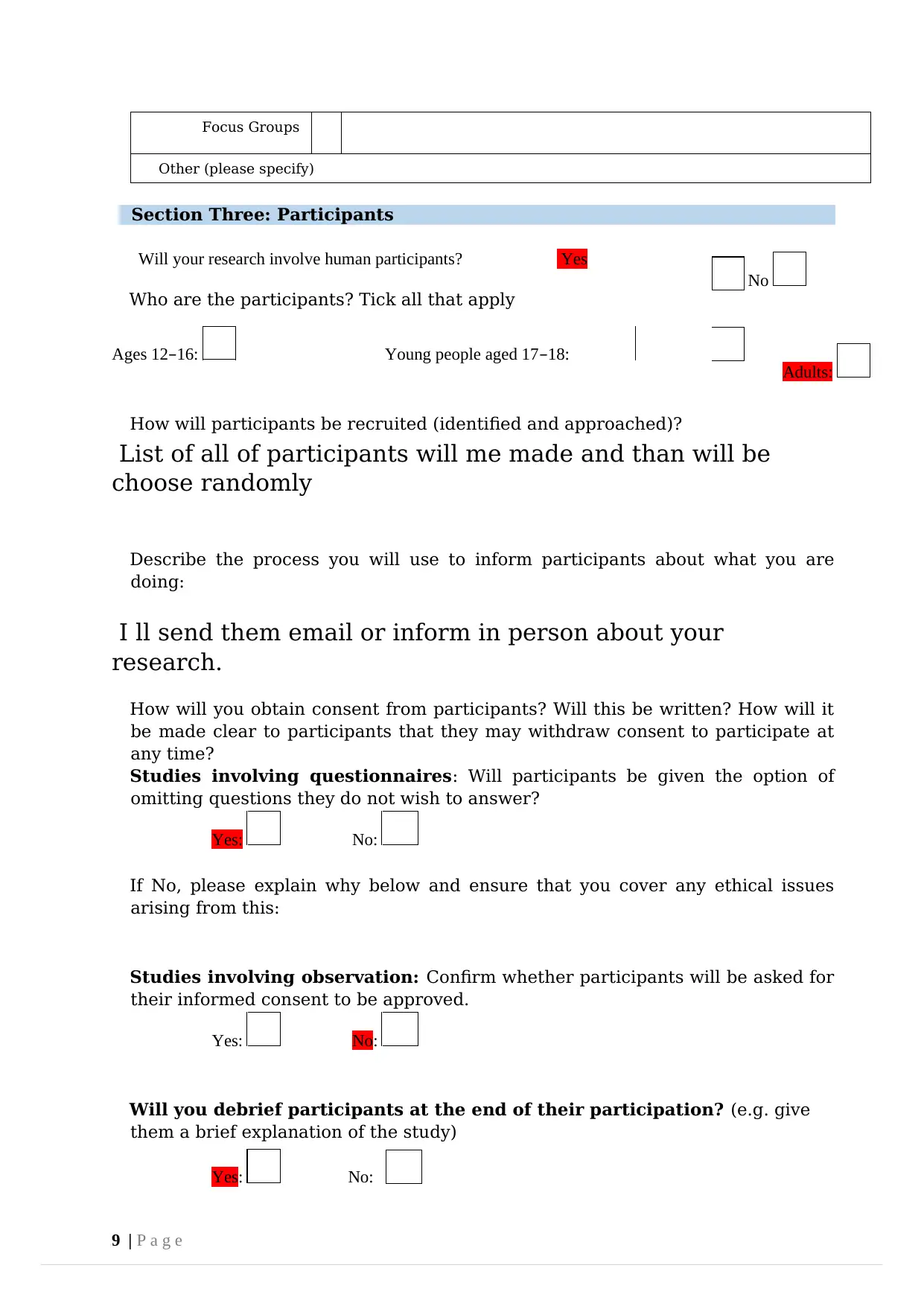
Focus Groups
Other (please specify)
Section Three: Participants
Will your research involve human participants? Yes
Who are the participants? Tick all that apply
Ages 12–16: Young people aged 17–18:
No
Adults:
How will participants be recruited (identified and approached)?
List of all of participants will me made and than will be
choose randomly
Describe the process you will use to inform participants about what you are
doing:
I ll send them email or inform in person about your
research.
How will you obtain consent from participants? Will this be written? How will it
be made clear to participants that they may withdraw consent to participate at
any time?
Studies involving questionnaires: Will participants be given the option of
omitting questions they do not wish to answer?
Yes: No:
If No, please explain why below and ensure that you cover any ethical issues
arising from this:
Studies involving observation: Confirm whether participants will be asked for
their informed consent to be approved.
Yes: No:
Will you debrief participants at the end of their participation? (e.g. give
them a brief explanation of the study)
Yes: No:
9 | P a g e
Other (please specify)
Section Three: Participants
Will your research involve human participants? Yes
Who are the participants? Tick all that apply
Ages 12–16: Young people aged 17–18:
No
Adults:
How will participants be recruited (identified and approached)?
List of all of participants will me made and than will be
choose randomly
Describe the process you will use to inform participants about what you are
doing:
I ll send them email or inform in person about your
research.
How will you obtain consent from participants? Will this be written? How will it
be made clear to participants that they may withdraw consent to participate at
any time?
Studies involving questionnaires: Will participants be given the option of
omitting questions they do not wish to answer?
Yes: No:
If No, please explain why below and ensure that you cover any ethical issues
arising from this:
Studies involving observation: Confirm whether participants will be asked for
their informed consent to be approved.
Yes: No:
Will you debrief participants at the end of their participation? (e.g. give
them a brief explanation of the study)
Yes: No:
9 | P a g e
⊘ This is a preview!⊘
Do you want full access?
Subscribe today to unlock all pages.

Trusted by 1+ million students worldwide
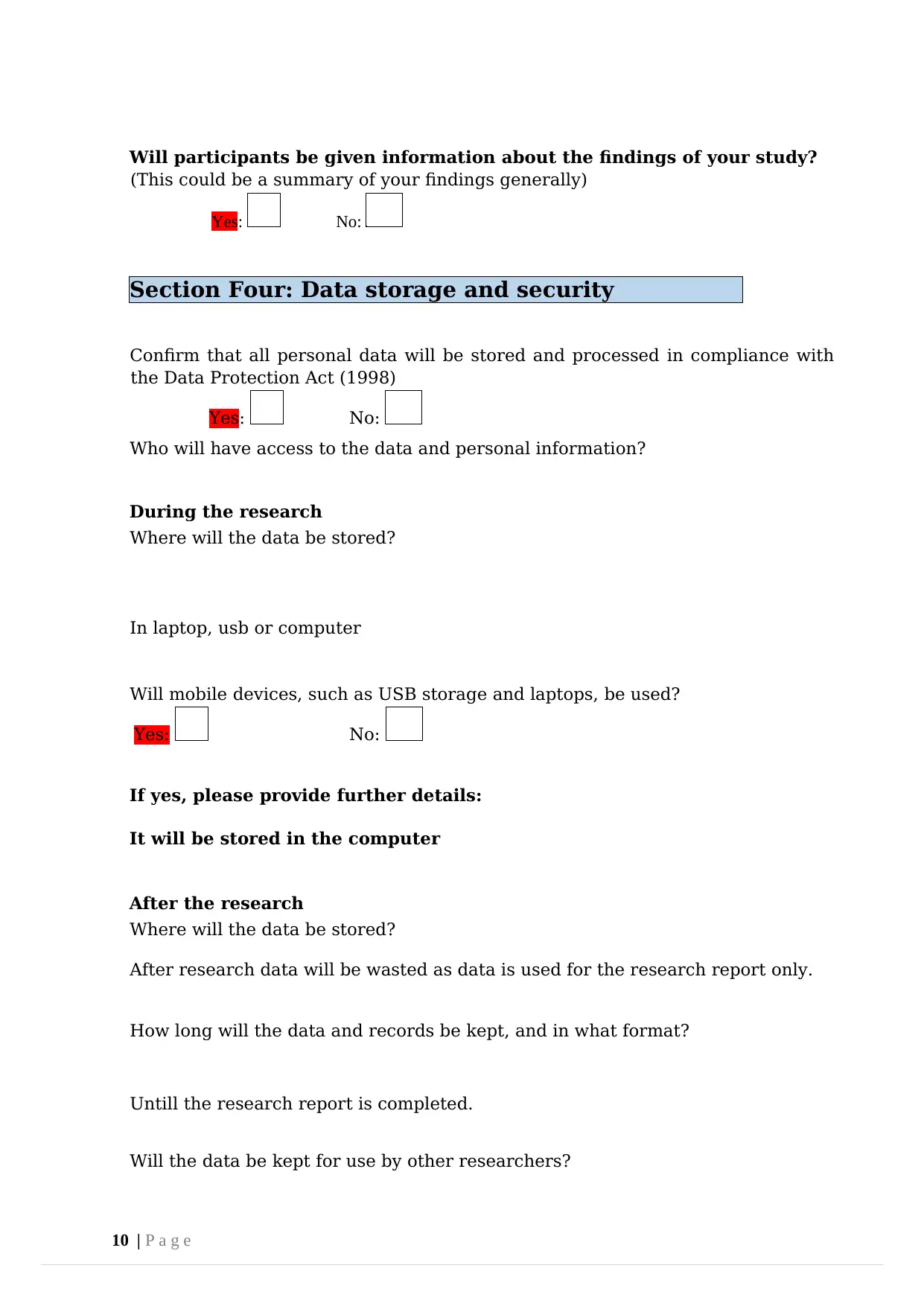
Will participants be given information about the findings of your study?
(This could be a summary of your findings generally)
Yes: No:
Section Four: Data storage and security
Confirm that all personal data will be stored and processed in compliance with
the Data Protection Act (1998)
Yes: No:
Who will have access to the data and personal information?
During the research
Where will the data be stored?
In laptop, usb or computer
Will mobile devices, such as USB storage and laptops, be used?
Yes: No:
If yes, please provide further details:
It will be stored in the computer
After the research
Where will the data be stored?
After research data will be wasted as data is used for the research report only.
How long will the data and records be kept, and in what format?
Untill the research report is completed.
Will the data be kept for use by other researchers?
10 | P a g e
(This could be a summary of your findings generally)
Yes: No:
Section Four: Data storage and security
Confirm that all personal data will be stored and processed in compliance with
the Data Protection Act (1998)
Yes: No:
Who will have access to the data and personal information?
During the research
Where will the data be stored?
In laptop, usb or computer
Will mobile devices, such as USB storage and laptops, be used?
Yes: No:
If yes, please provide further details:
It will be stored in the computer
After the research
Where will the data be stored?
After research data will be wasted as data is used for the research report only.
How long will the data and records be kept, and in what format?
Untill the research report is completed.
Will the data be kept for use by other researchers?
10 | P a g e
Paraphrase This Document
Need a fresh take? Get an instant paraphrase of this document with our AI Paraphraser
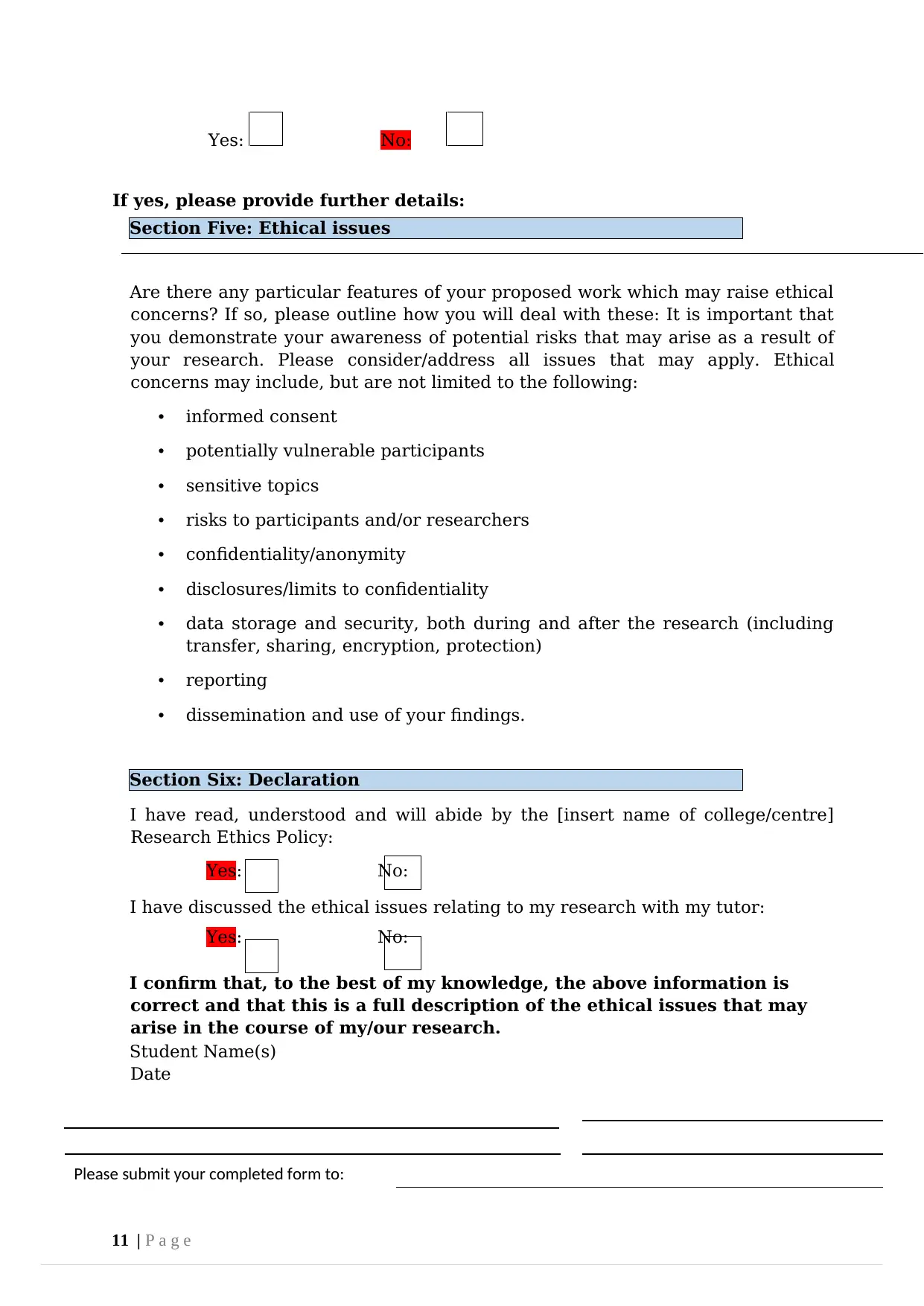
Yes: No:
If yes, please provide further details:
Section Five: Ethical issues
Are there any particular features of your proposed work which may raise ethical
concerns? If so, please outline how you will deal with these: It is important that
you demonstrate your awareness of potential risks that may arise as a result of
your research. Please consider/address all issues that may apply. Ethical
concerns may include, but are not limited to the following:
• informed consent
• potentially vulnerable participants
• sensitive topics
• risks to participants and/or researchers
• confidentiality/anonymity
• disclosures/limits to confidentiality
• data storage and security, both during and after the research (including
transfer, sharing, encryption, protection)
• reporting
• dissemination and use of your findings.
Section Six: Declaration
I have read, understood and will abide by the [insert name of college/centre]
Research Ethics Policy:
Yes: No:
I have discussed the ethical issues relating to my research with my tutor:
Yes: No:
I confirm that, to the best of my knowledge, the above information is
correct and that this is a full description of the ethical issues that may
arise in the course of my/our research.
Student Name(s)
Date
11 | P a g e
Please submit your completed form to:
If yes, please provide further details:
Section Five: Ethical issues
Are there any particular features of your proposed work which may raise ethical
concerns? If so, please outline how you will deal with these: It is important that
you demonstrate your awareness of potential risks that may arise as a result of
your research. Please consider/address all issues that may apply. Ethical
concerns may include, but are not limited to the following:
• informed consent
• potentially vulnerable participants
• sensitive topics
• risks to participants and/or researchers
• confidentiality/anonymity
• disclosures/limits to confidentiality
• data storage and security, both during and after the research (including
transfer, sharing, encryption, protection)
• reporting
• dissemination and use of your findings.
Section Six: Declaration
I have read, understood and will abide by the [insert name of college/centre]
Research Ethics Policy:
Yes: No:
I have discussed the ethical issues relating to my research with my tutor:
Yes: No:
I confirm that, to the best of my knowledge, the above information is
correct and that this is a full description of the ethical issues that may
arise in the course of my/our research.
Student Name(s)
Date
11 | P a g e
Please submit your completed form to:

12 | P a g e
⊘ This is a preview!⊘
Do you want full access?
Subscribe today to unlock all pages.

Trusted by 1+ million students worldwide
1 out of 12
Related Documents
Your All-in-One AI-Powered Toolkit for Academic Success.
+13062052269
info@desklib.com
Available 24*7 on WhatsApp / Email
![[object Object]](/_next/static/media/star-bottom.7253800d.svg)
Unlock your academic potential
Copyright © 2020–2026 A2Z Services. All Rights Reserved. Developed and managed by ZUCOL.




